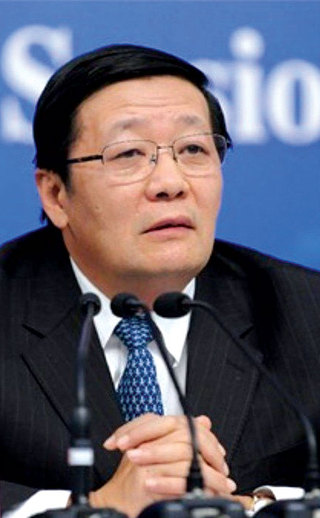
Tackling China’s structural challenges
Chinese finance minister Lou Jiwei reflects on removing roadblocks to ensure stable growth

China's economy is being affected by three overlapping dynamics: a change in its growth rate, structural adjustments and the digestion of earlier stimulus policies. In particular, the economy is grappling with the rise of long-term structural challenges that can act as a drag on total factor productivity and stable economic growth.
The structural issues are mainly manifested in four different forms. The first is related to labour. China faces an ageing population and declining ‘demographic dividend', with labour costs growing faster than productivity. Another is the decline in the marginal efficiency of capital. Investment returns are falling, the investment structure is imbalanced and there is a serious overcapacity problem. Furthermore, China has a high leverage ratio. The country's debt is growing as a proportion of GDP and some regions face high solvency pressures. Finally, institutional mechanisms hinder the efficient allocation of resources. The existence of industry monopolies and industry access barriers, the lack of high-skilled and innovative talents, the restraint on population flow, the complicated approval process, the difficulties in land expropriation, the sluggish progress of investment projects and the lag of rural land reform all act as obstacles.
To solve these problems, China is promoting supply-side structural reform, with a view to cutting down excessive production capacity, digesting unreasonable inventories, deleveraging and reducing costs. Meanwhile, the reform of key systems and mechanisms is also being stepped up. Reform is conducted with due consideration to the philosophies of innovation, coordination, the environment, openness and win-win development. The aim is to unleash potential productivity and nurture new growth momentum.
Establishing a modern fiscal pillar
A key element of China's development is establishing a modern fiscal pillar. This will require a comprehensive, standard, open and transparent modern budget system to improve the governmental budget. This will entail improving the transfer payment system and enhancing budget implementation.
It will also require setting up a tax system in favour of scientific development, social equity and market integration. China should reform its value-added, consumption, resource and real estate tax. It should also establish environmental protection and personal income tax systems.
Adjusting the fiscal relationship between the central and local governments is also important. China should set up a system that matches the authority of office with the responsibility over financial affairs. The central government can entrust the local governments with part of the authority and responsibility over financial affairs through the transfer payment system.
 Lou Jiwei, Chinese finance minister
Lou Jiwei, Chinese finance minister
In international exchanges, it is important to not only learn about current international norms but also to exercise major economy influence by taking an active part in improving these norms. We must defend China's territory and identify key national interests. It is also essential to understand our international counterparts and take proactive actions. We must urge developed countries to fulfil their due responsibilities and obligations in safeguarding the global economic order, opening up wider and boosting the world's economic recovery. The major economies' fiscal systems should help promote balanced and sustainable development, coordinate the domestic and overseas markets and identify the future trend of new technological revolution. It should also promote and expand outbound investment by encouraging enterprises to go global as well as achieving global industrial distribution.
Overcoming the middle-income trap
Other areas of the economy must also be reformed for China to overcome the middle-income trap. This includes agriculture. China should reduce the overall grain subsidies and encourage agricultural imports. Specifically, agricultural subsidy policies should be reformed to address the overuse of pesticide and chemical fertiliser, and to reduce distortions in the agricultural market. The food demand gap can be filled by imports while the agricultural ecosystem and resources can be restored through land retirement and crop rotation. By expanding the scale of agricultural operations, new skilled farmers can be trained, while more of the labour force can be transferred to non-agricultural sectors. In addition, to remove the barrier to labour flows, the government should look to provide educational and medical resources. It should also pursue household registration reform. The barriers of residence transfer should be broken down to allow for household registration with rented apartments.
Labour relation reform is also important. The Labor Contract Law should be adjusted in a timely manner to improve the flexibility of the labour market. To be more specific, China should promote the free flow of labour among various regions, industries and enterprises. It should ensure compensation is fairly determined between labour and management. Policies for gradually postponing the retirement age should also be studied and formulated to enhance labour force participation. Moreover, to improve labour quality, China should establish a modern vocational education system. It should also promote the integration of production and education and the cooperation between schools and enterprises, as well as enhance skills training among the working population.
A key element of China's development is establishing a modern fiscal pillar
Lou Jiwei, Minister of Finance
Another area is land reform. Relevant regulations on the expropriation and compensation of houses on state-owned and collective-owned land should be modified to promote investment programmes. The transfer, leasing and pooling of collective land for construction and commercial use in rural areas should be encouraged as long as it is in line with relevant planning and usage control policies. In regions with favourable conditions, the land quota system should be implemented. China should also encourage and guide farmers who have settled in urban areas to conduct paid transfer of their land contract right, land use right and collective income distribution right in accordance with the law.
There is also a need for social security system reform. The reform of the pension insurance system should be accelerated. China should establish an incentive and restraint mechanism that matches the amount and duration of insurance payment with that of insurance earnings. It should also set up a more transparent and straightforward receipt and payment system.
The medical insurance system should also be reformed. China should establish a reasonable and sustainable financing mechanism for the medical insurance system by developing the medical insurance payment policies for retired personnel. A medical insurance treatment adjustment mechanism should also be set up in accordance with the level of financing. To that end, China should implement a critical disease insurance system comprehensively in both rural and urban areas and reform the payment method of medical insurance. By integrating basic medical insurance systems, administrative reform can be carried out in public hospitals.
With the new urbanisation process, China should make improvements to hospitals at county and village level to establish a well organised, tiered diagnosis and treatment system.
Only users who have a paid subscription or are part of a corporate subscription are able to print or copy content.
To access these options, along with all other subscription benefits, please contact info@centralbanking.com or view our subscription options here: www.centralbanking.com/subscriptions
You are currently unable to print this content. Please contact info@centralbanking.com to find out more.
You are currently unable to copy this content. Please contact info@centralbanking.com to find out more.
Copyright Infopro Digital Limited. All rights reserved.
As outlined in our terms and conditions, https://www.infopro-digital.com/terms-and-conditions/subscriptions/ (point 2.4), printing is limited to a single copy.
If you would like to purchase additional rights please email info@centralbanking.com
Copyright Infopro Digital Limited. All rights reserved.
You may share this content using our article tools. As outlined in our terms and conditions, https://www.infopro-digital.com/terms-and-conditions/subscriptions/ (clause 2.4), an Authorised User may only make one copy of the materials for their own personal use. You must also comply with the restrictions in clause 2.5.
If you would like to purchase additional rights please email info@centralbanking.com








